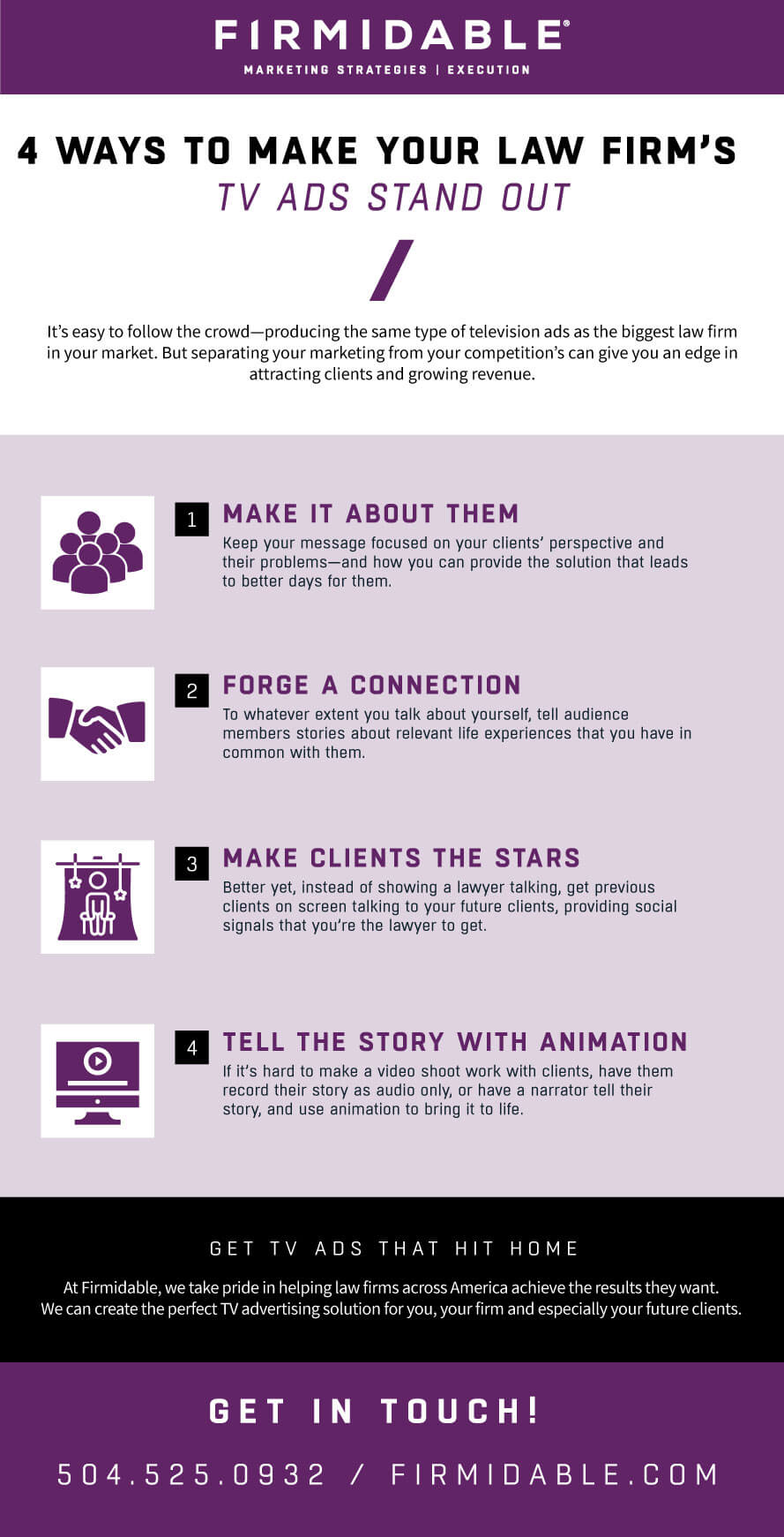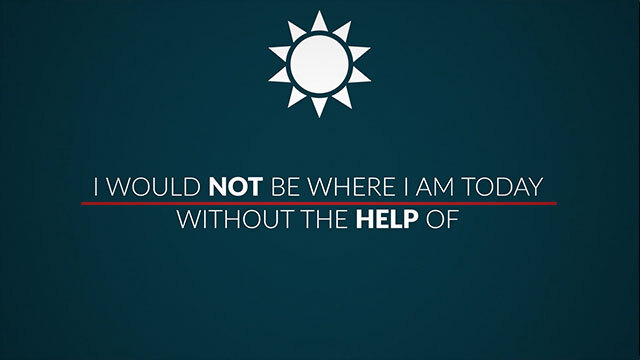How to Break Free of Cookie-Cutter TV Lawyer Commercials

TV is full of lawyers who are outspoken but don’t stand out. How do you distinguish your ads from all the cookie-cutter lawyer commercials?
You might feel you’re stuck with one real option: Trot out a partner, put him in a nice suit and have him talk aggressively about how hard your law firm fights. Maybe splice in some footage of crumpled cars and spinning police lights.
But if you open yourself to other approaches, you might find it pays off. More clients—and more revenue—could be just a strategy tweak away.
“Lawyers never even consider there’s another way,” said Nathan Chapman, Firmidable president. “But when we see non-legal TV commercials, we rarely see the CEO of McDonald’s or Nike or Home Depot talking to us. So why do lawyers want that?”
In this post, we’ll explain how to make television advertisements that win your law firm leads—not eye rolls.
If you want your firm’s ads to distinguish you from your competition, look to these elements:
1) Telling stories about your audience
2) Digging deeper into your motivation to be a lawyer
3) Considering ads where no lawyer appears on screen at all
RELATED
AWARD-WINNING LAWYER COMMERCIALS >>
No. 1: Make Your Law Firm Television Ads About the Audience, Not You
People connect with advertising that speaks to their situation. When people need lawyers, they’re looking for financial relief, sure. But they’re also experiencing something hard in their lives.
That’s where typical, money-driven TV lawyers can miss their target. Sure, the ads work sometimes. They might scare people into calling. But they won’t establish that special connection, where your client feels like a friend rather than a case number.
Let your potential clients know you understand what they’re going through—and how you can help them move on from their ordeal.
“Most lawyer advertising is about the lawyers, the advertisers. Why don’t we do more commercials about the people who are looking for solutions?” Nathan said. “People will identify with that more than they’ll identify with the lawyers.”
Consider a spot from the Cuddy Law Firm, a special education firm with offices in five states.
It features crisp footage of a realistic moment with a parent, child and school bus, not overwrought, gray-hued scenes. It uses camera angles that convey the perspective of the little girl.
It tells a story, which provides a much more powerful connection with your intended audience. It isn’t just a collection of random footage.
And it’s not until the very end when lawyer Andrew Cuddy appears briefly, letting clients know he can offer the help they need. The attorney is the secondary thought in this ad:
Amanda Pirt Meyer, an attorney at the Becker Law Office in Wisconsin, saw the value of messages reflecting the perspectives of potential clients when she helped make new TV spots for her firm last year.
She said lawyer commercials miss greater opportunities to win over clients when they only focus on money.
“You need a little fight, but you also need to be a human,” she said.
Her firm’s new spots drew heavily on the feelings clients constantly express to the attorneys:
No. 2: Sharing Your Motivation in a TV Ad Can Forge a Connection
The one exception, where talking about yourself is a powerful strategy, is when you can show viewers how they can personally relate to you.
Gary Bimberg, managing partner of Levine Benjamin Law Firm in Detroit, said sharing his personal motivation is something that helps him connect with clients. It’s been a game-changer for his practice.
In one of his most recent ads, he explains how his father’s experience with health problems inspires his practice of disability law. He said it’s consistently been one of the firm’s best performing advertisements.
“The one with me talking about my father, people mention that all the time,” he said. “They say it stands out. I think that’s a good thing.”
When people see that your own background may be similar to theirs—and you’ve experienced similar problems in your own family—you forge a connection with viewers.
Meyer also used this approach in one of her firm’s new spots, talking about her brother, who was injured in a terrible motorcycle accident in 2017. He needed to go through the Social Security Disability process with a traumatic brain injury (TBI)—which is exactly what the Becker Law Office helps people do.
This is the advertisement produced last year:
“It gives me a lot of street cred with potential clients.” Meyer said. “I get what goes on when you’re applying for disability.”
No. 3: What About Making a Lawyer Television Commercial without Any Lawyers?
Flipping the focus of an advertisement from the lawyer to stories the client can relate to is one thing.
What about taking it to the extreme and having no lawyer in the ad at all?
You have a couple practical options for doing this:
- Have some of your real clients tell their own stories in your ads.
- Use animation to illustrate the stories.
This personal injury spot for a law firm in Kentucky stars a client who was hurt in a car wreck. Not only does she appear genuine and real, she makes the firm sound like the real deal, too:
Or take this ad for the Julius & Simpson workers’ compensation law firm in South Dakota, which Firmidable made using audio of actual clients from the firm and animation of their words, no video of lawyers talking. (Learn more about workers’ comp law firm marketing here.)
The ads are specific and personal—the opposite of cookie cutter.
“We definitely got an uptick in calls; The feedback has been great,” said Margo Julius, partner at Julius & Simpson. “They allowed us to use the biggest asset we have—the people we’ve helped.”
If you’re looking for strategies to set your law firm apart from all the other lawyers—on TV or online—contact us at Firmidable.
Firmidable has been a national expert in legal marketing for almost 30 years. It brings law firms customized, data-driven marketing strategies and services, including online and traditional media for a wide range of legal practices. From Maine to Hawaii, it has transformed the lives of attorneys—and their clients.


